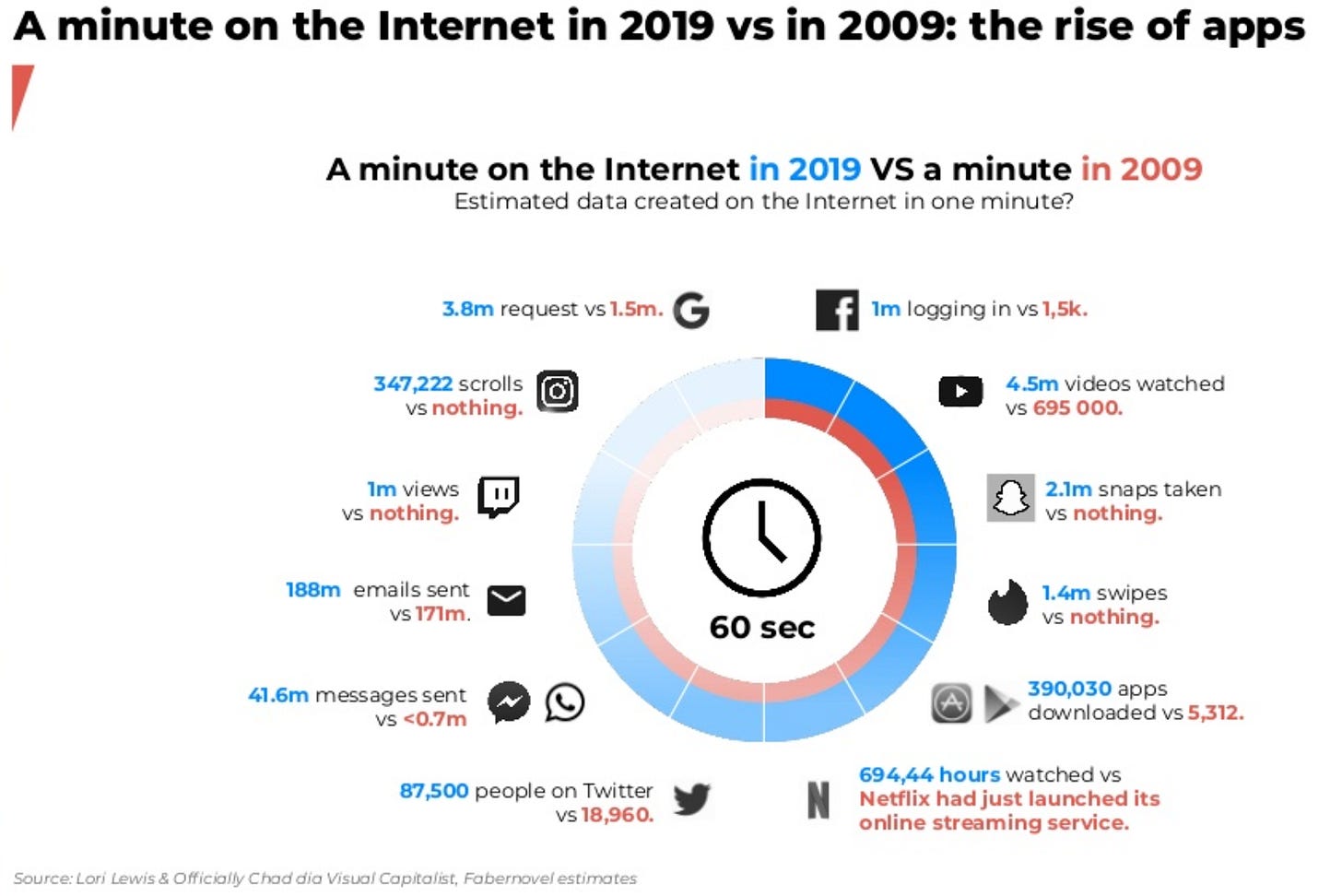Lyft vs Uber, the Internet in 2019, religion and tech
Ephemeral Reviews, Essays and Opinions s°02.ep04 - 2020.02.25
Who said ride-hailing was a winner-take-all market? In the US, Lyft is close to overtaking Uber as the #1 player. Link (T)
Why is it so hard to create sustainable dating services? Because “users tend to give up on them so easily, either because they get bored or they find what they’re looking for”. Still, new apps are trying to offer novel experiences to find success. Link (T)
We all practice garbage corporate language. But some bring it to a much higher level of garbage: Molly Young tries to answer why corporations speak the way they do and reads WeWork’s IPO prospectus like “something a person wrote in the middle of an Adderall overdose with a gun to his head.” Fierce and funny. Link (S)
Corporate America crossover and such a symbol of maturity and current power balance between pure players and incumbents, last week Morgan Stanley offered to take over E-Trade while LendingClub bought Radius Bank, respectively the biggest acquisition in the finance industry since the 2008 financial crisis and a first fintech takeover of a regulated US bank. (S)
The best way to predict the future of an industry is to study the past and other industries.
Looking at the endless pendulum between personal computing (from the original hippie-hackers to Michael Dell) and centralized infrastructures (from Hal 9000 to The Cloud), I often think of the exact opposite swing occurring in the utilities sector. In the mid 19th Century, Georges Eugène Haussmann remodeled Paris to build the city we know today. His architecture and urbanism were empowered by vanguardist engineers like Eugène Belgrand, a hydrologist and a strong believer in 1830’s hygienist principles. Their project: to build an underground network of pipes and sewers to drain pure water from sources hundreds of miles away and to send the city garbage and waste water as far as possible from Paris. A kind of Cloud for utilities that has been the state-of-the-art urban developments for a century. But we are now experiencing a movement towards the opposite scale with individualized and hyper-local utilities facilities like cogeneration micro-units, solar panels, dry toilets…
A model for our digital infrastructures, our data, their protection and their eco-efficiency? Maybe. But there is an even more inspiring experimentation occurring in the utilities sector and Paris, again, those days. And this is not the world’s largest urban farm to open next year on one of its rooftops.
Back in 2010, former Paris mayor, Bertrand Delanoë took the decision to municipalize (i.e. nationalize at the city level) the water authority operated by two private operators so far. His ambition was to reconcile commons, profits and space for innovation. Moving a step forward, last week, Paris water authority announced they will subsidize 200 farms cultivating over 300,000 acres around the city for a total amount of 47 million euros to help them opt for a more sustainable production system, using less agricultural inputs and pesticides. A plan aimed to promote positive externalities for citizens, consumers and farmers and minimize the negative externalities that impact the environment.
A really smart public policy and a real-life example of commons management that could inspire thinkers and regulators for our digital industries in the current and necessary shifting balance between centralization and decentralization.
(S)
Fabernovel’s latest GAFAnomics Quaterly is out. In a decade, a minute on the Internet changed dramatically. (S)
For the first time, synthetic biologists discovered a new antibiotic for tackling a drug-resistant bacteria using a machine learning system that identified a candidate from more than 107m molecules. Link (S)
Teenagers are leveraging Instagram and its features to create thriving thrift shops. Link (T)
Dear keen reader, you know the future of party is an issue I have been considering recently. What happens and how do people party in a country where hundreds of millions are quarantined, all cinemas and nightclubs closed? Stuck at home due to coronavirus, millions of Chinese are partying online. Link (S)
Org charts are the new chic: 2 startups, ChartHop and The Org, raised funds last weeks to make organizations more transparent, both for insiders and outsiders. We live in a networked economy, now it’s time to make it visible. (T)
Scary but so efficient, is deepfake the most powerful tool for future political campaigns? Maybe soon but not yet. (S)
Religion and tech, a match made in heaven? In Utah, Mormons have created a successful tech hub. The factors at work: a pioneering spirit going back to the 19th century, frugality in spending and “the most strenuous sales “boot camp” in the world: a two-year mission spreading Mormonism abroad”. But don’t expect beers on Friday, you’ll only find ice-cream machines. Link (T)
Religion and tech again. The growing anxiety about technology has prompted a “humane technology” movement among former Silicon Valley insiders disquieted by what their industry has wrought. But there’s another group, utterly unconnected to Google or Facebook or Apple, that has been practicing humane technology for generations: the Amish. Link (S)
And a podcast for the very first time in Stéréo. A very worrying inquiry by Kashmir Hill, a technology reporter for the New York Times, on Clearview.ai, a startup leading the facial recognition surveillance market and backed by Peter Thiel. Scary. Link (S)
All the emotions, in one image. Link (T)
Did you enjoy this newsletter?
Copyright © 2020 Fabernovel, All rights reserved.
Edited by Stéphane Distinguin (S), Founder and CEO of Fabernovel, and Tom Morisse (T), Fabernovel alum and Knowledge Manager at Spendesk, Stéréo is a digital-oriented newsletter highlighting the main developments and weak signals affecting the world’s societies and economies.
Fabernovel is a talent company that creates digital products and services to support companies in their transformation and innovation trajectory.
Congratulations! You've reached the bottom of the page. Here's your reward.





